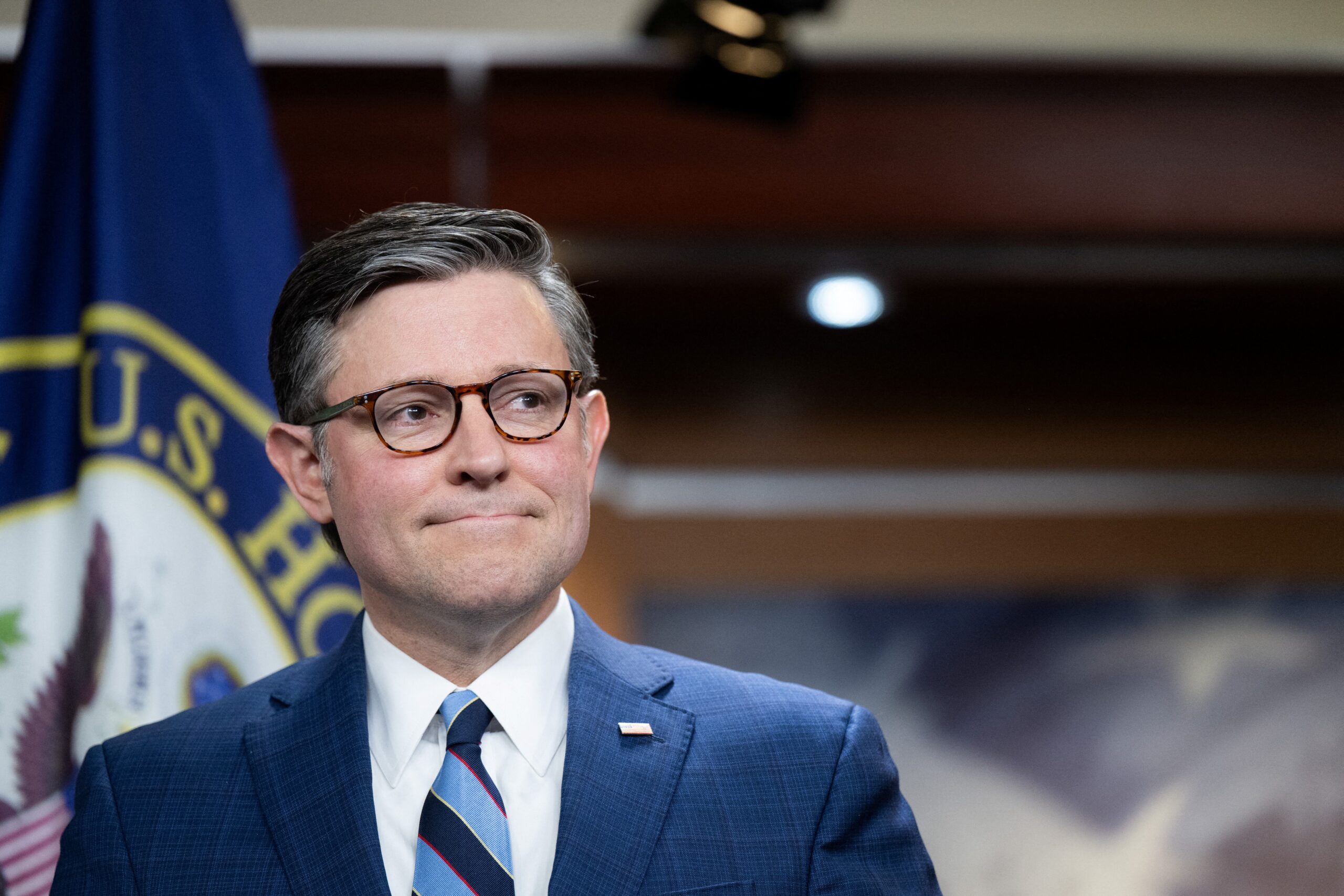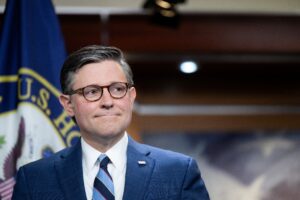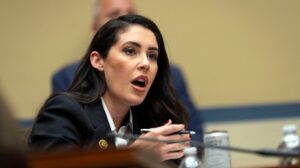Politics
Cash-strapped DNC takes on $15 million in loans
The Democratic National Committee took out $15 million in loans in October, according to a new filing with the Federal Election Commission submitted on Thursday.
The national party committee framed the line of credit as an early investment to boost its candidates in New Jersey and Virginia earlier this month, and help build up state parties ahead of next year’s midterms. But the need for a loan still puts the DNC in sharp contrast with its GOP counterpart, the Republican National Committee, which was sitting on $86 million at the end of September.
DNC Chair Ken Martin said the early investment was already helping the party win elections this month and position itself for what is to come.
“We can’t win elections or fight back against Trump if the D.N.C. downsizes operations like it often does after a presidential cycle,” Martin said in a statement. “I made a bet that investing early would build power, rack up wins and rally supporters back to the table. That bet is paying off.”
The loans were first reported by the New York Times.
The DNC also spent $16.9 million in October, the most it has spent in any single month this year. Driving that total was election-related spending: The national party spent over $6 million in New Jersey and Virginia to boost Democratic gubernatorial candidates, along with hundreds of thousands of dollars in Pennsylvania to help retain control of the state’s Supreme Court.
Democrats won all those races.
The national party committee also continues to send roughly $1 million each month to state party committees, and has a larger staff than it did at this time in 2017. It reported $18.3 million cash on hand at the end of October.
The DNC has taken out loans before, although usually not this early in the cycle or of this magnitude all at once. In Trump’s first term, when the national party similarly faced fundraising lags, it reported $3.2 million in debt in November 2017 — this same time in the cycle — and more than $7 million a few months later, according to past FEC filings. The DNC has not reported more than $15 million in total debt since February 2014.
But the national party has faced slower fundraising this year as many major donors have stayed on the sidelines amid the DNC’s rebuilding efforts. The party’s fundraising numbers have improved slightly in recent months, and it raised $7.5 million from donors in October, not far off from the same month in 2021.
The party committee’s cash totals were also hit earlier in the year as it paid off $18 million in lingering expenses from former Vice President Kamala Harris’ 2024 campaign.
Politics
Tina Smith endorses Peggy Flanagan over Angie Craig in Minnesota Senate race
Sen. Tina Smith is endorsing Minnesota Lt. Gov. Peggy Flanagan as her successor over Rep. Angie Craig, taking sides in a hotly contested primary to fill Smith’s Senate seat that’s been roiled in recent weeks by the Trump administration’s aggressive immigration enforcement efforts.
“Today, 3,000 federal agents are terrorizing our communities,” Smith said in a video announcing her pick that was shared first with Blue Light News. “I know that right now there is no one that I trust more to stand with Minnesota than Lt. Gov. Peggy Flanagan.”
Flanagan, in the video, called it an “honor” to have the retiring senator’s endorsement and pledged to “continue in her footsteps.”
“We’re going to push back against the status quo and send a progressive fighter to continue representing us in Washington, D.C.,” Flanagan said.
Smith’s endorsement comes a day before the state’s Democratic and Republican precinct caucuses, the first step in each party’s formal endorsement process.
In selecting Flanagan, Smith is elevating a fellow lieutenant governor and progressive over Craig, a moderate, for the seat she has held since 2018. Smith is the eighth sitting senator to endorse Flanagan, who also has the backing of Sens. Bernie Sanders (I-Vt.), Elizabeth Warren (D-Mass.) and other members of the so-called Fight Club of progressive senators of which they are all a part. Former Sen. Al Franken (D-Minn.), who held the seat before Smith, also endorsed Flanagan.
Craig has some high-profile endorsements of her own, with five senators including Sens. Ruben Gallego (D-Ariz.), Tammy Baldwin (D-Wis.) in her corner, as well as former Speaker Nancy Pelosi (D-Calif.) and former Transportation Secretary Pete Buttigieg.
And it comes against the backdrop of deadly incidents involving federal agents enforcing President Donald Trump’s immigration crackdown in the state that have opened new fissures in the Senate primary. While both candidates have called for Homeland Security Secretary Kristi Noem’s impeachment, Flanagan has attacked Craig for taking “pro-Trump” immigration votes last year, while Craig has countered that her rival is being “disingenuous” about the content and context of the measures.
Nonpartisan public polling in the race has been scant. Polling conducted in the past month for Flanagan’s team, as well as a separate survey commissioned by a pro-Flanagan group, shows the lieutenant governor with a double-digit lead over Craig. A poll commissioned by Craig’s campaign showed the race within the margin of error.
Craig has built a fundraising advantage in the race, raising $2 million in the fourth quarter of 2025 and starting the election year with $3.7 million in cash on hand. Flanagan, meanwhile, raised roughly $1 million in that timeframe and ended the year with $810,646 in the bank.
Politics
Mike Johnson says House can end government shutdown ‘by Tuesday’

The House speaker projected confidence about swiftly getting his caucus in line to pass spending for the Department of Homeland Security…
Read More
Politics
Senate Ag advances crypto bill along party lines
The Senate Agriculture Committee voted along party lines Thursday to advance a landmark cryptocurrency bill, sending the measure to the Senate floor without bipartisan backing. The committee voted 12-11 to advance so-called crypto market structure legislation, which would create new rules governing how digital tokens are regulated…
Read More
-

 The Dictatorship12 months ago
The Dictatorship12 months agoLuigi Mangione acknowledges public support in first official statement since arrest
-

 Politics12 months ago
Politics12 months agoFormer ‘Squad’ members launching ‘Bowman and Bush’ YouTube show
-

 The Dictatorship5 months ago
The Dictatorship5 months agoMike Johnson sums up the GOP’s arrogant position on military occupation with two words
-

 Politics12 months ago
Politics12 months agoBlue Light News’s Editorial Director Ryan Hutchins speaks at Blue Light News’s 2025 Governors Summit
-

 The Dictatorship12 months ago
The Dictatorship12 months agoPete Hegseth’s tenure at the Pentagon goes from bad to worse
-

 Politics12 months ago
Politics12 months agoFormer Kentucky AG Daniel Cameron launches Senate bid
-
Uncategorized1 year ago
Bob Good to step down as Freedom Caucus chair this week
-

 Politics10 months ago
Politics10 months agoDemocrat challenging Joni Ernst: I want to ‘tear down’ party, ‘build it back up’







